Ellen and I spend a lot of time wondering about things  that some people call psychological or spiritual. Like, I was making lunch today and I thought, “Wow, when we die and don’t have bodies anymore, we won’t have anything to worry about. It seems like it will be all about connecting.” Ellen said, “No wonder it seems like everything we learn these days is about how to connect. It will be a swimming pool of connection on the other side.” When I served the purple and white rice with melted cheese, I said, “Maybe that’s why God created this Earth School, because so many souls needed to learn how to connect respectfully.” We recently had a difference of opinion with Ellen’s family members about the expectations for a small dessert party we were throwing for them. The challenge is that they would not be after the same image and flow for the party that we might be trying to provide. How do we accommodate that?
that some people call psychological or spiritual. Like, I was making lunch today and I thought, “Wow, when we die and don’t have bodies anymore, we won’t have anything to worry about. It seems like it will be all about connecting.” Ellen said, “No wonder it seems like everything we learn these days is about how to connect. It will be a swimming pool of connection on the other side.” When I served the purple and white rice with melted cheese, I said, “Maybe that’s why God created this Earth School, because so many souls needed to learn how to connect respectfully.” We recently had a difference of opinion with Ellen’s family members about the expectations for a small dessert party we were throwing for them. The challenge is that they would not be after the same image and flow for the party that we might be trying to provide. How do we accommodate that?
This might seem like a trivial thing, but it reflects real life on every level. It doesn’t matter whether we are talking about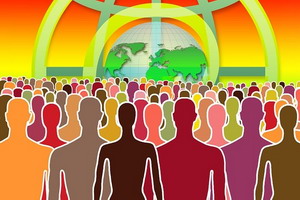 a dessert party or international relations between countries. The question is how do we adapt to the reality that everyone is different? Each party’s goals, needs, desires, expectations, and so on are unique to them. How do you get everyone to participate civilly demonstrating some level of respect when they are all so different? Every party wants to get their way and they believe they are entitled to get exactly what they want just because they want it. We just went through a national election in this country where this divisive demand for “my way, my way” was heard constantly from both sides with little to no respect for the validity of the opposition’s perspectives. After a certain point, the actual perspectives became irrelevant and the focus became about how effectively one side could disrespect the other side.
a dessert party or international relations between countries. The question is how do we adapt to the reality that everyone is different? Each party’s goals, needs, desires, expectations, and so on are unique to them. How do you get everyone to participate civilly demonstrating some level of respect when they are all so different? Every party wants to get their way and they believe they are entitled to get exactly what they want just because they want it. We just went through a national election in this country where this divisive demand for “my way, my way” was heard constantly from both sides with little to no respect for the validity of the opposition’s perspectives. After a certain point, the actual perspectives became irrelevant and the focus became about how effectively one side could disrespect the other side.
If this level of head bashing was limited to political ra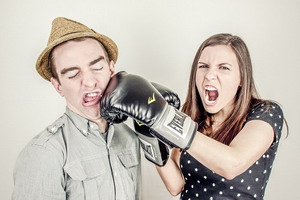 ces, it might be tolerable, but it is not. Families fight, neighbors fight, religions fight, ethnic groups fight, genders fight, countries fight, everyone seems to fight. At the bottom of every fight is a belief in an entitlement to get things a particular way. The illusion is that “my way is the right way.” This is of course absurd. No human has a clue as to what the right way is. All they have is their particular preferred outcome. It’s interesting how the preferred outcome always has the believer coming out on top and the opposition getting the short end of the stick. To me that looks an awful lot like “right” has a bit of bias in it. Why is that? Where do we get this idea that we know what is right and everyone else has it wrong for some reason? Just exactly when were we given the title of all-knowing and righteous and who gave us that title?
ces, it might be tolerable, but it is not. Families fight, neighbors fight, religions fight, ethnic groups fight, genders fight, countries fight, everyone seems to fight. At the bottom of every fight is a belief in an entitlement to get things a particular way. The illusion is that “my way is the right way.” This is of course absurd. No human has a clue as to what the right way is. All they have is their particular preferred outcome. It’s interesting how the preferred outcome always has the believer coming out on top and the opposition getting the short end of the stick. To me that looks an awful lot like “right” has a bit of bias in it. Why is that? Where do we get this idea that we know what is right and everyone else has it wrong for some reason? Just exactly when were we given the title of all-knowing and righteous and who gave us that title?
My conjecture today is that we are circling the core of the issue with “my way is the right way”. I suspect that the real issue is a belief in our righteousness. At least when I delve into m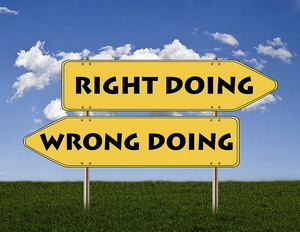 y righteousness I find that at the end of the day, I rely on what feels right to me. I can dance around with hours of mental rhetoric and logical analysis supporting my feelings, but it is my feelings that rule the day. I see two factors at play here. One is what I believe to be a truth, which is that we are right to choose our path in life. Our feelings as to what is right and what is wrong are there to guide us in making the moment-to-moment decisions that we must make every day. We often don’t understand why we feel the way we do, but frequently our feelings are the result of previous experiences producing outcomes we either liked or didn’t like. We learn to associate certain situations and participants with those outcomes, and in turn, generate feelings toward those things. Our life is all about learning from experience and using those experiences to help us navigate our lives in the present and future.
y righteousness I find that at the end of the day, I rely on what feels right to me. I can dance around with hours of mental rhetoric and logical analysis supporting my feelings, but it is my feelings that rule the day. I see two factors at play here. One is what I believe to be a truth, which is that we are right to choose our path in life. Our feelings as to what is right and what is wrong are there to guide us in making the moment-to-moment decisions that we must make every day. We often don’t understand why we feel the way we do, but frequently our feelings are the result of previous experiences producing outcomes we either liked or didn’t like. We learn to associate certain situations and participants with those outcomes, and in turn, generate feelings toward those things. Our life is all about learning from experience and using those experiences to help us navigate our lives in the present and future.
That use of feeling right is good and appropriate to my mind. But a second issue arises from a deep reality that other peo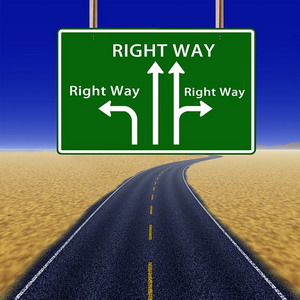 ple’s feelings are real to them but not to us. No matter how hard we try, we can not feel another person’s feelings. We can sympathize or empathize, but we can not feel what they feel. Their feelings are built out of a lifetime of experience which we do not have. We might be able to recall similar experiences, but not the same ones. Our reactions to our experiences will not be the same as theirs to their experiences. This produces an immediate bias in our assessment of the world. When we consider who is right and who is wrong, we are perceiving a feeling assessment first. And we can’t feel their side. That means the deck is always stacked in our favor. Our way feels right because only our way feels real. We are incapable of feeling the realness of their side. So we are automatically biased to believe that our way is the right way.
ple’s feelings are real to them but not to us. No matter how hard we try, we can not feel another person’s feelings. We can sympathize or empathize, but we can not feel what they feel. Their feelings are built out of a lifetime of experience which we do not have. We might be able to recall similar experiences, but not the same ones. Our reactions to our experiences will not be the same as theirs to their experiences. This produces an immediate bias in our assessment of the world. When we consider who is right and who is wrong, we are perceiving a feeling assessment first. And we can’t feel their side. That means the deck is always stacked in our favor. Our way feels right because only our way feels real. We are incapable of feeling the realness of their side. So we are automatically biased to believe that our way is the right way.
This is a profound point of contemplation that has been described in various psychological approaches as well as certain traditional religions and philosophies. On our deepes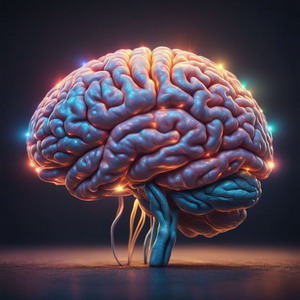 t level of consciousness, we don’t have any proof that anything outside ourselves exists. Back then it was framed to me as “What proof do you have that you are not just a brain floating in a jar somewhere having what you believe are sensory experiences being electrically fed into you?” I remember this being a profound point of contemplation for me personally back when I was only 16. I went around and around with that one for quite a while because I could not come up with any proof that I was not just a brain in a jar. Eventually, I compromised and said that if I was a brain in a jar and nothing I experienced was real then so what? I could either just shut down or I could go along with the possible illusion as though it were real and go along for the ride. To this day I still have no answer for this conundrum. But what this essential uncertainty does to us is it makes us value our continued existence over others. We are inherently biased because we don’t know if the other guys are even real.
t level of consciousness, we don’t have any proof that anything outside ourselves exists. Back then it was framed to me as “What proof do you have that you are not just a brain floating in a jar somewhere having what you believe are sensory experiences being electrically fed into you?” I remember this being a profound point of contemplation for me personally back when I was only 16. I went around and around with that one for quite a while because I could not come up with any proof that I was not just a brain in a jar. Eventually, I compromised and said that if I was a brain in a jar and nothing I experienced was real then so what? I could either just shut down or I could go along with the possible illusion as though it were real and go along for the ride. To this day I still have no answer for this conundrum. But what this essential uncertainty does to us is it makes us value our continued existence over others. We are inherently biased because we don’t know if the other guys are even real.
I believe that our sense of entitlement arises from a fundamental bias that only we are inherently real. In reality, ther e is no such thing as entitlement, and no one has the power to grant us the right to always be right or get our way. Every moment of our lives shows us otherwise. There is no absolute right or wrong, only things we like or dislike. Our way is not the best for anyone but ourselves, and we are not entitled to anything. Yet, everyone wholeheartedly believes in their sense of entitlement. The only way I can account for this universal condition is that it must arise from the critical truth we all share: that we know and feel that we are for sure real. When you strip away all the mental stories and experiential muck of life, all you have are your feelings. You are the experiencer, and that defines your existence. The philosopher Rene Descartes phrased it as “I think therefore I exist.” This is the common meme, but when you read his work more closely you see what he means is “I can reflect on my experience and therefore I exist.”
e is no such thing as entitlement, and no one has the power to grant us the right to always be right or get our way. Every moment of our lives shows us otherwise. There is no absolute right or wrong, only things we like or dislike. Our way is not the best for anyone but ourselves, and we are not entitled to anything. Yet, everyone wholeheartedly believes in their sense of entitlement. The only way I can account for this universal condition is that it must arise from the critical truth we all share: that we know and feel that we are for sure real. When you strip away all the mental stories and experiential muck of life, all you have are your feelings. You are the experiencer, and that defines your existence. The philosopher Rene Descartes phrased it as “I think therefore I exist.” This is the common meme, but when you read his work more closely you see what he means is “I can reflect on my experience and therefore I exist.”
I’m sending this newsletter at the end of the year because it’s a good time to reflect on the past year and put it into s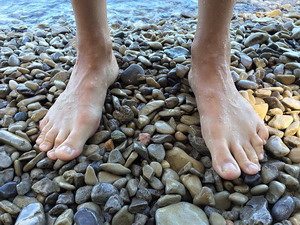 ome sort of perspective. It’s been an intense year, and it seems to foreshadow a lot of changes in the near future. Maybe nothing will change, but then again maybe there will be a lot of changes. For me, it’s important to get my feet firmly planted on solid philosophical ground to prepare for possible change. My message to myself from this year is to abandon the illusion of entitlement to anything. I can work to build the life I like, but I have to do this by creating value for myself through being of service to others. It’s this value that empowers me to build what I want, not any entitlements.
ome sort of perspective. It’s been an intense year, and it seems to foreshadow a lot of changes in the near future. Maybe nothing will change, but then again maybe there will be a lot of changes. For me, it’s important to get my feet firmly planted on solid philosophical ground to prepare for possible change. My message to myself from this year is to abandon the illusion of entitlement to anything. I can work to build the life I like, but I have to do this by creating value for myself through being of service to others. It’s this value that empowers me to build what I want, not any entitlements.
David
Ellen
Ellen had her family over for Christmas day but this time we did a dessert party. They already had evening plans for a tra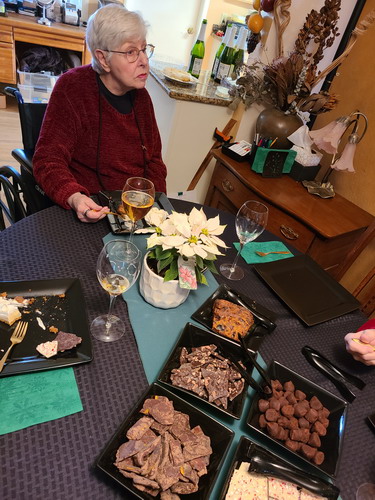 ditional Christmas dinner, so we offered them many varieties of sugar – mostly chocolate. Good times were had by all and they carried away all the yummy sugar goodies so that we could get back on the straight and narrow tomorrow.
ditional Christmas dinner, so we offered them many varieties of sugar – mostly chocolate. Good times were had by all and they carried away all the yummy sugar goodies so that we could get back on the straight and narrow tomorrow.
|
|
Flavonoids fight allergies
Flavonoids are chemicals found in many foods like berries, tea, apples, and aloe vera. New research is demonstrating that these flavonoid foods turn down the body’s immune response to allergenic foods in the diet.
that these flavonoid foods turn down the body’s immune response to allergenic foods in the diet.
___________________________
“Others treat you in accordance with how you truly feel about yourself.“
~ David DeLapp
_____________________________________
Years ago (2006) the government decided to outlaw our
 best decongestant – pseudoephedrine because folks were making it into meth. Big pharma like J&J replaced it with phenylephrine and told us it was just as good. But the tested reality is that it does nothing. Now the Aussies are suing for false advertising.
best decongestant – pseudoephedrine because folks were making it into meth. Big pharma like J&J replaced it with phenylephrine and told us it was just as good. But the tested reality is that it does nothing. Now the Aussies are suing for false advertising.
____________________________
“You pay in some way for everything you ever get, there is no free ride. You can not take more than you give or the resources run dry.“
~ David DeLapp
________________________________________
Kombucha gives fasting like effects
The combination of microbes and yeasts found in kombucha has been found to change how lab subjects process fat. This allowed for greater fat loss and better triglyceride levels, much 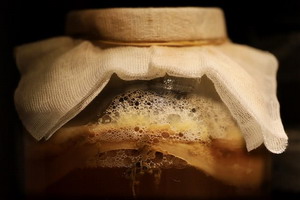 like fasting does. Hopefully this same effect shows up in humans.
like fasting does. Hopefully this same effect shows up in humans.
________________________
“It is no one’s job to be what or how you want; they get to be themselves.“
~ David DeLapp
